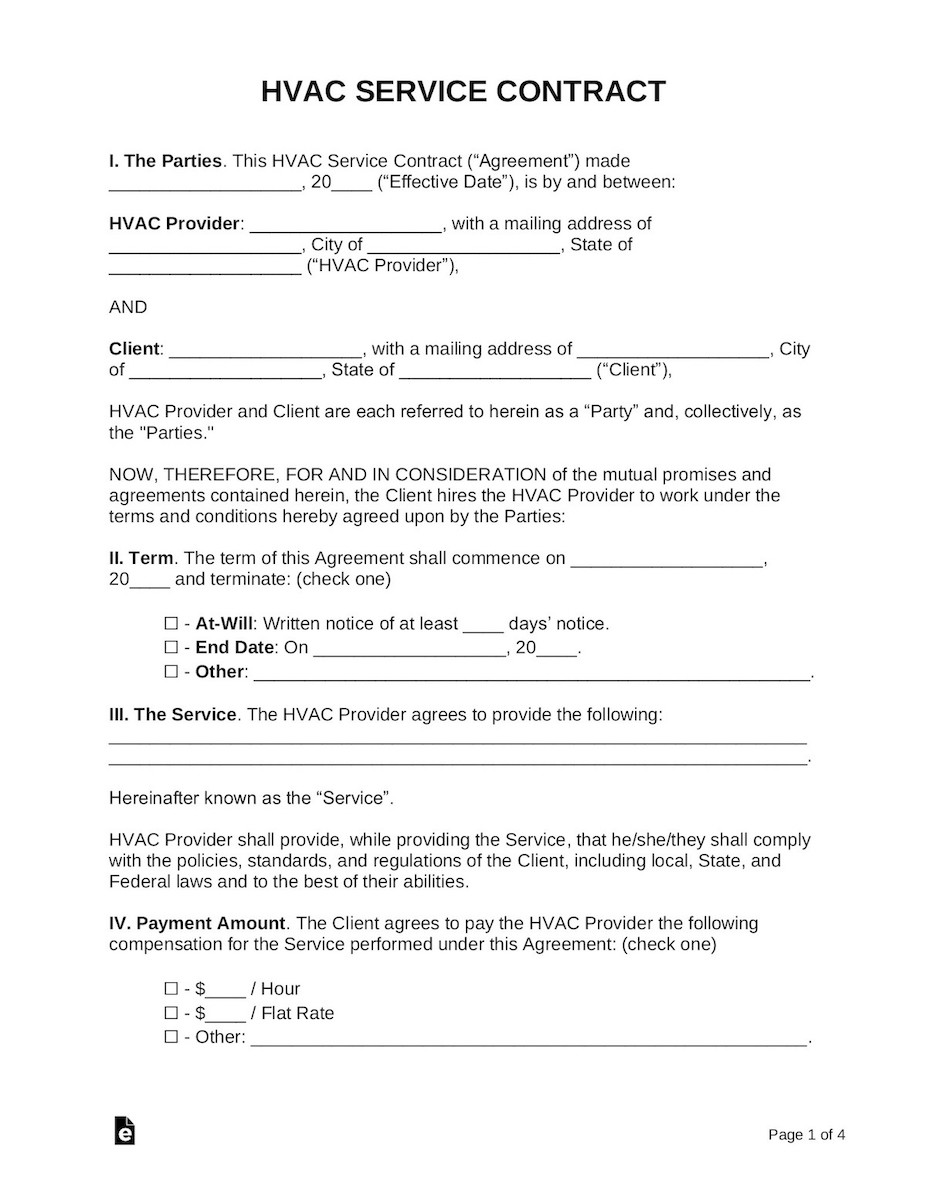An HVAC system (heating, ventilation, and air conditioning) is crucial for maintaining comfortable indoor environments. Regular maintenance is essential to ensure these systems operate efficiently and last longer.
So, how do you work with clients to ensure that you’re the one who they come to for setup and ongoing maintenance?
This blog aims to help service professionals understand what HVAC service contracts are and how they can benefit from using them. Let’s get started.
What is an HVAC service contract?
An HVAC service contract is a formal agreement between a customer and an HVAC service provider. The contract sets out the terms for regular maintenance and emergency services for an HVAC system. This helps prevent breakdowns and ensures the system operates efficiently all year round.
Customers usually pay an annual or monthly fee in exchange for scheduled check-ups, repair services, and priority assistance during system failures. Typical elements in a service contract include:
- Scheduled maintenance visits. Regular tune-ups are essential to keep your HVAC system running smoothly. These visits often occur seasonally (fall and spring), when HVAC units need the most adjustment to handle changing temperatures.
- Emergency services. Many contracts include emergency services, providing customers with priority access to repair services outside normal business hours. This is critical for sudden breakdowns in extreme weather.
- Regular inspections. Technicians inspect each part of the system to catch small issues before they turn into expensive repairs. Inspections may cover thermostats, ductwork, filters, and electrical connections.
- Cleaning and repairs. Cleaning components like filters, coils, and blowers helps maintain efficiency and air quality. Minor repairs might also be covered to prevent wear and tear from escalating into larger issues.
- Replacement parts. Some contracts cover the cost of parts like air filters or refrigerants, while others may offer discounts on more expensive parts that need occasional replacement.

Image credit: eForms
Benefits of an HVAC maintenance agreement
An HVAC maintenance agreement offers key advantages that keep your clients’ systems running at their best and eliminate unexpected expenses. Here’s why using a maintenance contract is worth considering:
Improved system efficiency
Regular maintenance means an HVAC system doesn’t have to work as hard to heat or cool a space. Clean filters, lubricated parts, and well-tuned components allow the system to operate efficiently, which can lead to lower energy bills for your clients.
Extended equipment lifespan
Just like any major equipment, an HVAC system lasts longer when it’s taken care of. With regular check-ups and tune-ups, wear and tear is minimized, reducing the risk of major breakdowns and leading to happier clients. Maintenance helps extend the life of critical components, which saves your clients from the high cost of replacing parts — or the entire unit — earlier than expected.
Preventive care to avoid costly repairs
One of the biggest advantages of an HVAC maintenance agreement is the preventive care it provides. You can identify minor issues and fix them before they lead to bigger, more expensive repairs.
For example, a seemingly minor problem like a clogged filter or worn-out belt will eventually cause overheating and put stress on the entire system. With regular check-ups, you can catch these issues early, reducing the risk of sudden, expensive failures.
Priority service on repairs
Most HVAC maintenance agreements include priority service on parts or repairs, meaning you can help clients faster and ensure you’re the first one to get called if something does go wrong. This is especially valuable during peak seasons, when HVAC companies are often swamped with service requests. Knowing that you’ll give priority service can bring peace of mind — especially when your clients’ heating or cooling stops working in extreme weather.
What do HVAC maintenance agreements cover?
HVAC maintenance agreements offer a range of essential services designed to keep heating and cooling systems running smoothly. These agreements cover standard maintenance tasks that prevent breakdowns, enhance efficiency, and extend the life of the system. Here’s a breakdown of what’s typically included and a few optional services you might also consider.
The most common services in an HVAC maintenance contract include:
- Inspections. Routine inspections are a fundamental part of any HVAC maintenance agreement. During an inspection, a technician assesses the entire system — including thermostats, ductwork, and electrical components — to identify potential issues.
- Cleaning. Dirt and debris can clog key parts of an HVAC system, reducing efficiency and straining the equipment. Cleaning includes replacing or washing filters, clearing dust from ducts, and cleaning coils and blower components.
- Repairs. Most maintenance agreements cover minor repairs discovered during inspections, such as tightening loose connections or replacing worn belts.
Your HVAC service contract might also include optional services, such as:
- Parts replacement. Some agreements cover the replacement of specific parts, like air filters, refrigerants, or thermostat batteries, while others offer discounts on more substantial parts replacements, like compressors or fan motors.
- Upgrades. Certain HVAC companies may offer upgrade options as part of their maintenance agreements. These could include upgrading to a smart thermostat, adding air purifiers, or enhancing filtration systems to improve air quality and efficiency.
How to choose an HVAC service agreement
Looking for an HVAC service agreement yourself? Finding and selecting the right one can feel overwhelming, but a few key steps will help you find a reliable provider and a plan that fits your needs. Here’s a quick guide on what to look for.
Tips on evaluating service providers
- Check certifications. Always verify that the service provider is certified and licensed to perform HVAC maintenance in your area. Certifications from organizations like NATE (North American Technician Excellence) or EPA (Environmental Protection Agency) indicate that technicians are trained to handle HVAC systems safely and professionally.
- Review customer feedback. Look at online reviews, testimonials, and ratings on platforms like Google, Yelp, or the Better Business Bureau. Consistent positive feedback about the provider’s reliability, response time, and professionalism is a strong indicator of quality service. Conversely, multiple complaints or unresolved issues might be a red flag.
- Evaluate service provider experience. The experience of the provider matters, especially with complex systems or older equipment. Choose a company with a solid track record and extensive experience working on systems similar to yours. Plus, more experienced providers tend to have the expertise to troubleshoot a wide range of HVAC issues efficiently.
Factors to consider when choosing a plan
- Cost. Compare the costs of different service agreements to see what fits your budget. Keep in mind that a lower upfront price doesn’t always mean better value — some plans may offer more comprehensive coverage or include perks that justify a slightly higher cost.
- Services included. Review what each plan covers. Does it include only basic inspections, or are there options for emergency repairs and parts replacements? Make sure the services in the plan align with your needs. If your system is older, a plan with more comprehensive repair coverage may be worth the investment.
- Contract length. HVAC service agreements vary in terms of duration, from month-to-month options to multi-year commitments. Consider your own needs and preferences. Shorter contracts offer flexibility if you’re trying out a new provider, while longer terms might lock in lower rates or additional services for the duration.
What is the cost of HVAC service contracts?
As indicated by our research, annual HVAC service contracts can range from basic plans costing around $150 to comprehensive plans that can cost up to $500 or more. Factors affecting the cost include:
- Size of the home. Larger homes often have bigger or multiple HVAC units, which require more time and resources to service, resulting in higher costs.
- Type of HVAC system. Some systems, such as mini-splits or complex multi-zone units, require more extensive maintenance than standard split systems. Mini-splits, for instance, may cost between $290 and $550 per year to maintain.
- Coverage level. Plans range from basic maintenance-only packages to comprehensive “full-coverage” contracts, which include repairs, emergency service, and priority scheduling. Full-coverage contracts typically cost more because they cover both parts and labor for any needed repairs.
- Frequency of maintenance visits. Annual maintenance contracts, which generally include a single yearly visit, can cost between $85 and $170. Plans with bi-annual or quarterly visits are more expensive, averaging $170 to $340 for bi-annual and up to $700 for quarterly check-ups.
How to negotiate your HVAC service contract
Getting an HVAC service contract can bring peace of mind and regular maintenance to your clients, but negotiating the terms helps you drive profits and ensure client satisfaction. Here are some tips to help you secure a favorable contract for both sides:
- Offer discounts. Many HVAC companies offer seasonal promotions or discounts for first-time customers. Additionally, consider a discount for those signing up for a longer-term contract, as well as matching your competitors’ rates. Senior citizens, veterans, or those in certain occupations may also qualify for special rates.
- Create customized plans. Every home’s HVAC needs are different, so don’t be afraid to create tailored plans that fit those of your clients. With a newer or simpler system, your clients might need fewer visits or less coverage. On the other hand, older or more complex systems might benefit from added services. Custom plans ensure your clients pay for everything they need and that nothing gets missed.
- Negotiate service frequency. Standard contracts typically include annual or bi-annual visits, but your clients’ needs may vary. If they have a newer system, you may be able to reduce the number of visits, which can lower costs for them and time for you. Alternatively, if a system runs frequently or has specific maintenance needs, you may want to negotiate more frequent visits for better protection.
Here are a couple of specific terms to focus on during negotiations:
- Cancellation policies. Detail the cancellation terms carefully to set expectations around any fees or penalties you need to enforce should your client end the contract early. Some companies allow you to cancel at any time with little to no fee, while others may have restrictions or charge a percentage of the remaining contract value.
- Price escalation clauses. Some HVAC service contracts include clauses that allow providers to raise rates each year, which you might consider. Make sure to make these as clear as possible so that your clients don’t feel blindsided by hidden costs.
How to renew your HVAC service contract
Your clients may choose to renew their HVAC service contract, which is a great opportunity to reassess needs and secure better terms. Here’s a step-by-step guide to ensure you’re renewing on the best terms possible.
- Review your current contract. Before renewing, take a close look at your existing contract to understand what services are covered, the frequency of visits, and any current rates or terms.
- Schedule a pre-renewal inspection. Offer to perform an inspection before the renewal to assess the current state of the HVAC system. This can reveal any emerging issues or potential future maintenance needs that might impact your contract and pricing. Some providers may offer this as a complimentary service, while others charge a small fee.
- Initiate renewal process. Once you’re ready, get in touch with your client to discuss renewing. Ensure that any updates to service terms, pricing, or frequency are clearly documented in the renewed contract.
- Negotiate renewal terms. Just because you’re renewing doesn’t mean you have to accept all the original terms. Use this time to negotiate terms, such as service frequency, rates, and added benefits like priority service. Many companies are willing to make adjustments to retain long-term customers, so it’s worth considering.
- Confirm all details and get everything in writing. Confirm that all negotiated terms are clearly documented in the contract. Review the fine print with your client and keep a signed copy on file.
Here are a few considerations you’ll want to take before renewing an HVAC service contract:
- Evaluate the quality and value of your current service contract.
- Consider any necessary changes in service needs.
- Verify contract portability and transferability.
- Assess energy efficiency and cost benefits.
- Offer any loyalty discounts or incentives.
- Confirm policy on unused visits or services.
Common issues and solutions with HVAC service contracts
Service contracts can be incredibly useful, but they sometimes come with challenges. Here’s a rundown of common issues and practical solutions to help both sides get the most from the contract.
- Issue: Misunderstanding of service contract coverage.
- Solution: Clarify terms beforehand in detail.
- Issue: Service delays.
- Solution: Ensure clear communication and set expectations for turnaround times.
- Issue: Hidden or unexpected fees.
- Solution: Offer detailed invoices with a complete breakdown of charges.
- Issue: Automatic renewals without notice.
- Solution: Review and address renewal policies carefully before anyone signs.
- Issue: Limited flexibility in scheduling.
- Solution: Go over all your scheduling options, like whether you offer evening or weekend appointments.
- Issue: Inconsistent service quality.
- Solution: Assign a preferred technician to each job if possible.
Key takeaways
Using an HVAC service contract is a key step toward protecting your clients’ systems and avoiding costly breakdowns. Regular maintenance brings clear benefits, like:
- Improved energy efficiency.
- Extended equipment lifespan.
- Better indoor air quality.
But, offering a plan that matches your specific client needs is essential. By understanding the factors that affect service contract costs, from the size and type of the HVAC system to the terms and coverage provided, you can make informed pricing choices that fit your clients’ homes and budgets.
Remember to:
- Clarify contract details.
- Consider service frequency needs.
- Offer preventative solutions to common HVAC issues.
Looking for a better way to stay on top of all your contracts, prioritizing the most promising opportunities? Watch the video below.
Want to learn more about how Method:Field Services works?
Check out our demo or try it free for 14 days (no credit card required).
HVAC service contract FAQs
Is an HVAC service contract worth it for small homes?
For small homes, HVAC service contracts can be cost-efficient and help maintain indoor air quality. Typically, these homes benefit from lower service costs and more manageable maintenance schedules.
Can an HVAC service contract save money on energy bills?
Regular maintenance improves system efficiency, reducing energy costs. For example, cleaning coils and filters can prevent energy waste and lower utility bills.
Can I cancel an HVAC service contract at any time?
Cancellation policies vary, but most contracts include terms and potential fees for early termination. Before canceling, consider the remaining benefits and any penalties.


